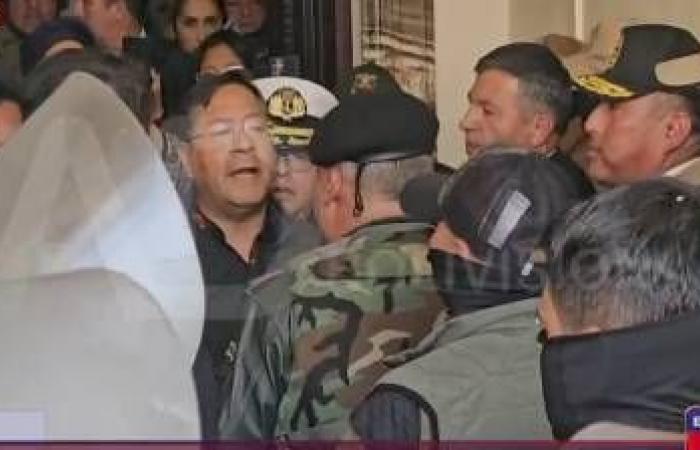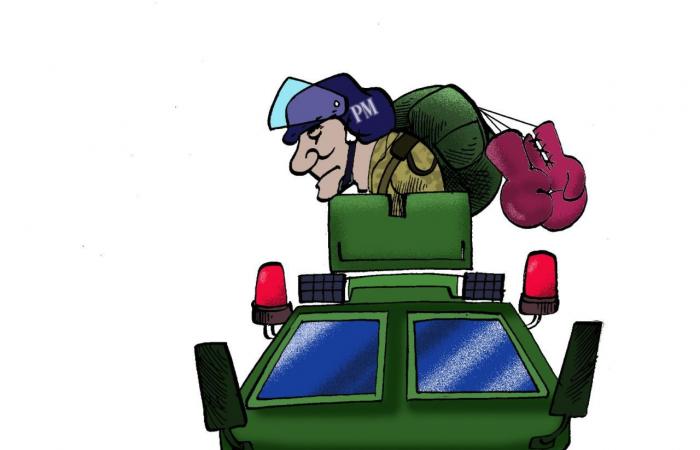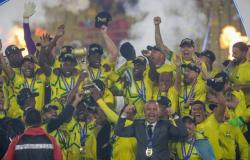Representatives of the people who remained for several hours this Wednesday guarding the Quemado Palace, while rebellious soldiers prohibited them from reaching the doors, celebrated with President Luis Arce the withdrawal of the Military Police gendarmes led by the general and former head of the Army, Juan José Zúñiga, whose forces attacked the entrance to the presidential headquarters with an artillery tank, in an attack on democracy, considered an attempt to seize power that reminded many of the images of the Pinochet siege against Salvador Allende.
Journalists from Boliviana de Televisión called the events, which the channel broadcast live, as well as the multinational Telesur, a “coup adventure,” and raised fears of a repeat military coup in the Andean nation, which is why they immediately mobilized the organizations social, popular and union groups in rejection of the riot, and transmitted the repudiation of leaders of the international community to a breakdown of the constitutional order.
“The coup plotters will not pass,” chanted the crowd with Vice President David Choquehuanca, who along with Arce and the rest of the cabinet celebrated the victory in the same Plaza Murillo that, for approximately the previous three hours, had remained occupied by the uniformed men, who They launched tear gas and pepper, as well as pellets, to prevent the passage of citizens.
Zúñiga, who local media said the night before had been deposed, which they later denied, announced a change in the cabinet and, in an emboldened manner, assured that he and the uniformed men who followed him would free all the military and political prisoners, starting with the Santa Cruz coup leader Luis Fernando Camacho, and including the former de facto president Jeanine Áñez, head of the spurious Government that massacred the people after the coup inflicted on Evo Morales and the MAS in 2019.
A few moments earlier, inside the presidential headquarters that Zúñiga invaded by force, Arce had advanced to meet the military chief, with whom he had, face to face, an altered exchange during which he would have asked him to abandon his attitude and order the troops. the withdrawal, according to what journalists commented when transmitting the images of the clash. But Arce’s call was ignored by Zúñiga.
By that time, the Bolivian Workers’ Central (COB) had declared a general strike and mobilized in support of democracy, and called on members and non-members to rally in its defense.
In parallel, social and popular organizations, as well as peasant organizations, had also announced that they were in emergency and were mobilizing to stop the attempt, as BTV transmitted through its envoys in the departments of Santa Cruz, Pando and the town of El Alto in La Paz. among other cities where representatives of the people announced that they were heading to the capital to defend the Government.
During the period, from the Great House of the People, adjacent to the Quemado Palace and where the members of the cabinet had gathered around Arce, the Minister of Government, María Nela Prada, denounced the attempted coup and requested internal support and external to Bolivian democracy, as did the chancellor, Celinda Sosa, among other voices of the executive and the institutions.
Shortly after, in a message from the same presidential headquarters and accompanied by his ministers, Arce declared to the people that he remained there, rejecting any coup attempt, and called on the people to organize and mobilize against the coup in progress.
“We cannot allow, once again, coup attempts to take Bolivian lives,” he exclaimed.
The battle for institutionality found its corollary when, still in that headquarters together with the heads of the executive, who had been joined by popular representatives, Arce, by presidential decree, appointed new military chiefs, including the Commander of the Army, a responsibility that was granted to José Wilson Sánchez, with which Zúñiga was effectively and automatically deposed.
Gerardo Zabala Álvarez was imposed as general commander of the Air Force, and Renán Wilson Guardia Ramírez as commander of the Navy.
Slogans of support for the executive and the unit were heard in the premises, where the newly appointed head of the Army, in his capacity as Commander of that body, said: “I order, I order, that all personnel mobilized in the streets must return to their places.” units.
Arce also used the word to denounce the attempted coup d’état in progress and highlighted that there were also military personnel “who know that respect for the Constitution and current norms is the most important thing.”
«The Government is here in Casa Grande with its cabinet, the Vice President, the people and the good soldiers who know how to respect the State Constitution; “We will respect the democracy won with the vote of the Bolivian people at the polls,” he proclaimed, and saluted “the international organizations that have reproached this act, the friendly countries that have spoken out in favor of democracy; to all those who are there at this moment: mayors, governors, social organizations that are speaking out against any action against the people.
The governments of Nicaragua, Venezuela, Cuba, Mexico, Colombia, Chile, Ecuador, Paraguay, Peru and Brazil expressed their support for the Bolivian constitutional executive headed by Luis Arce and demanded respect for democracy, as did the Honduran president Xiomara Castro on behalf of the Community of Latin American and Caribbean States (Celac), the Bolivarian Alternative for the Peoples of Our America-People’s Trade Treaty (ALBA-TCP) and the Puebla Group, among others.
To the Argentina of Javier Milei in a succinct message from his Foreign Ministry and the questioned
The head of the OAS who previously supported the coup against Evo, Luis Almagro, spoke out tepidly.
“We call on the people to mobilize and remain calm, because all Bolivians, together, are going to defeat any coup attempt,” said Luis Arce during the combative event at the Casa del Pueblo.
In minutes, the images transmitted the withdrawal of the disgraceful tanks from Plaza Murillo, which began to be taken over by the people. The brief but dangerous chapter of the coup that put the country and much of the international community in suspense had ended.
Loyalty and unity
The cohesion of the executive and the social and popular organizations around it, the loyalty of the high military commanders, and the speed with which the executive acted seem to be the essential elements that ensured the safeguarding of order and constitutionality in Bolivia, together with the support it received from leaders in Latin America and the world.
Once the victory was consummated, which became visible with the withdrawal of the tanks and the rebellious soldiers from Plaza Murillo—but not before advancing toward the crowd, threatening, at the moment of their retreat—the Prosecutor’s Office issued an arrest warrant against Zúñiga. Shortly after, he was arrested at the doors of the General Staff that he previously directed, and which he abandoned without resistance.
In its statement, the judiciary announced that all necessary elements would be required to investigate the events, which unfolded unexpectedly and as quickly as they were extinguished.
Interviewed by BTV, Bolivian political analyst Hugo Moldiz commented that two readings could be made of the events. The first, that Zúñiga had acted motivated by reports that he would be removed from his position as a result of threats made by him against former President Morales and against the head of the Senate, Andrónico Rodríguez.
The other possibility, which the specialist endorsed, is that of the presence of intellectual authors behind the attempt. “We will have to see where the investigations lead,” he said.
Photo: Adan Iglesias







